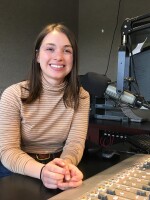Renowned primatologist Dr. Jane Goodall addressed a sold-out Eccles Center Wednesday evening, as the keynote speaker for Park City’s Mountain Towns 2030 conference.
What do chimpanzees have to do with climate change? Jane Goodall says the climate crisis has far-reaching impacts, including the drying of chimpanzees’ forest habitats.
“We used to have short rains and long rains, and now we just have rains and sometimes it's dry in the middle of the rain," Goodall said. "So, everything's changing, and this will affect the chimpanzees' ranging patterns and when the food becomes available.”
Goodall’s work in Gombe, Tanzania in the 1960s led to the discovery that chimpanzees make and use tools, a behavioral indicator that chimps aren’t so different from humans. Goodall told her life story at Wednesday’s lecture, beginning with her curiosity about animals as a child, to moving from London to Kenya on a whim to work with anthropologist Louis Leakey, to efforts through the Jane Goodall Institute to help towns near chimpanzee habitats protect the environment and sustain their communities in a self-sufficient way.
Goodall travels the world 300 days out of the year. Throughout her journeys, she’s seen the results of climate change, and she says one way to convey the urgency of the situation is to share stories.
“You know, I talk about standing in Greenland and seeing the icebergs break off—crash into the ocean—and being with Inuit elders who say, 'well, the ice never used to melt here, even in the summer,'" Goodall said. "Meeting people who've had to leave their island homes because at high tide they’re no longer habitable, or certainly in a storm, and then going to places in Australia where it hasn't rained for seven years and they've had to kill their livestock.”
As someone who transitioned from her career as a scientist to the role of an activist, Goodall has advice for those who are looking to get involved.
“To learn what they can about what's happening and see how their interests and their particular skills fit into that and do their bit," Goodall said. "Nobody can do everything, so the most important thing is to find something where you can make a difference and roll up your sleeves and get out there and take action.”
Goodall was introduced Wednesday by her longtime friend, environmentalist Paul Hawken. The event was the only Mountain Towns 2030 session open to the public, with several hundred tickets available to community members for purchase and free tickets for students.



